中学英语基础知识分类总复习
初中英语总复习(全册)知识点归纳
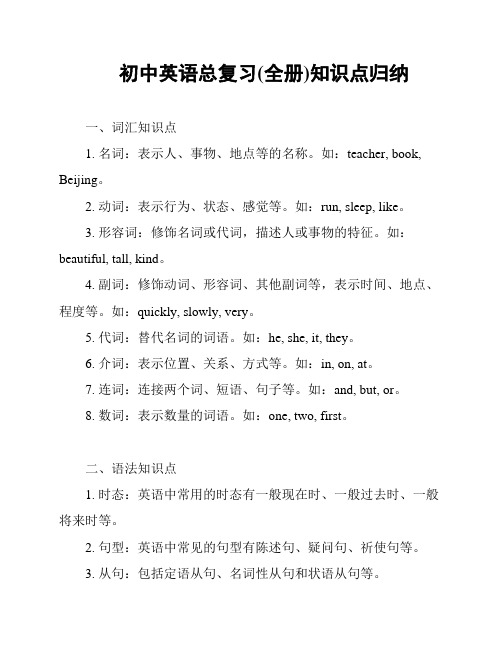
初中英语总复习(全册)知识点归纳一、词汇知识点1. 名词:表示人、事物、地点等的名称。
如:teacher, book, Beijing。
2. 动词:表示行为、状态、感觉等。
如:run, sleep, like。
3. 形容词:修饰名词或代词,描述人或事物的特征。
如:beautiful, tall, kind。
4. 副词:修饰动词、形容词、其他副词等,表示时间、地点、程度等。
如:quickly, slowly, very。
5. 代词:替代名词的词语。
如:he, she, it, they。
6. 介词:表示位置、关系、方式等。
如:in, on, at。
7. 连词:连接两个词、短语、句子等。
如:and, but, or。
8. 数词:表示数量的词语。
如:one, two, first。
二、语法知识点1. 时态:英语中常用的时态有一般现在时、一般过去时、一般将来时等。
2. 句型:英语中常见的句型有陈述句、疑问句、祈使句等。
3. 从句:包括定语从句、名词性从句和状语从句等。
4. 否定形式:在英语中通过在句子中加入否定词来表示否定的意思。
5. 疑问形式:在英语中通过改变句子语序或加入疑问词来构成疑问句。
6. 介词短语:一种由介词和它的宾语构成的结构,用来修饰名词或动词。
三、阅读技巧1. 抓主题:阅读时要注意抓住文章的主题,从中找出关键信息。
2. 理解词义:通过上下文,猜测不认识的单词的意思。
3. 推理推断:通过已知信息进行推理,得出未知信息。
4. 划重点:将文章中所述的重要信息标记出来,有助于记忆和理解。
5. 阅读速度:提高阅读速度的技巧有先读标题、段落开头和结尾。
以上是初中英语总复的知识点归纳,希望对你的复有所帮助!。
浩海学校高中英语 英语基础知识分类总复习(六)9
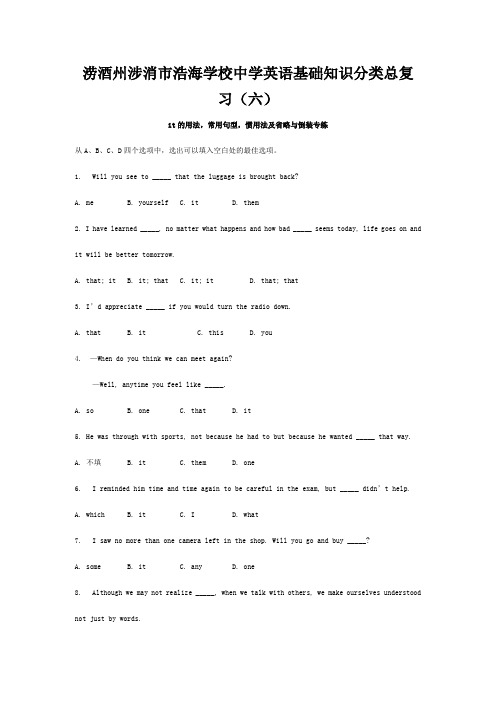
涝酒州涉消市浩海学校中学英语基础知识分类总复习(六)it的用法,常用句型,惯用法及省略与倒装专练从A、B、C、D四个选项中,选出可以填入空白处的最佳选项。
1. Will you see to _____ that the luggage is brought back?A. meB. yourselfC. itD. them2. I have learned _____, no matter what happens and how bad _____ seems today, life goes on and it will be better tomorrow.A. that; itB. it; thatC. it; itD. that; that3. I’d appreciate _____ if you would turn the radio down.A. thatB. itC. thisD. you4. —When do you think we can meet again?—Well, anytime you feel like _____.A. soB. oneC. thatD. it5. He was through with sports, not because he had to but because he wanted _____ that way.A. 不填B. itC. themD. one6. I reminded him time and time again to be careful in the exam, but _____ didn’t help.A. whichB. itC. ID. what7. I saw no more than one camera left in the shop. Will you go and buy _____?A. someB. itC. anyD. one8. Although we may not realize _____, when we talk with others, we make ourselves understood not just by words.A. thisB. thatC. itD. these9. To tell you the truth, the accident and the damage _____ resulted in frightened me so much that I almost gave up driving.A. of thatB. itC. of whichD. what10. —What kind of house would you like?—I’d like _____ with a garden in front of _____.A. the one; itB. one; itC. it; itD. one; one11. _____ is often said that in the war the winner writes the history.A. AsB. ThisC. ThatD. It12. Jane owes _____ to her father that she has been able to finish her college education.A. thatB. muchC. itD. 不填13. —Do remember to take this medicine three times a day.—_____.A. Heard itB. Made itC. Got itD. Taken it14. —Steven has got the first prize in the math contest.—_____ is no wonder that he looks so happy today.A. AsB. ItC. ThisD. That15. If we keep on polluting the environment, the white plastic rubbish will be the last thing to tell other creatures that “_____ once an earth”.A. there wasB. there isC. there haveD. there had16. —What a pity! My new Walkman doesn’t work. _____ must be something wrong wi th it.—Don’t worry. Let me have a look.A. ItB. ThereC. ThatD. This17. _____ is no need for us Chinese to go to native countries to learn English now.A. ThereB. ItC. ThisD. That18. I really can’t stand _____ when people cut in be fore I have finished my speech.A. itB. thatC. theseD. them19. It was _____ the manager said at the meeting _____ made all the employees unhappy.A. what; thatB. that; thatC. what; whatD. that; what20. It is the ability to do the work _____ will get you promoted not where you come from.A. whoB. thatC. whatD. it21. It was not _____ she was a few steps from me _____ I recognized she was my old school friend.A. when; thatB. until; thatC. until; whenD. when; then22. I was disappointed with his speech. I had expected _____ to be a more exciting one.A. thatB. thisC. oneD. it23. With the social orders getting worse in that country, it will be many months _____ the tourist markets return to normal.A. sinceB. afterC. beforeD. when24. _____ is no use arguing with that old woman over that matter.A. ThereB. ItC. ThatD. This25. To build up her health, my wife has made _____ a rule to get up at six every morning and then do some exercise.A. herselfB. thatC. thisD. it26. —I hate talking with that guy. Look, he is coming. What should I do?—Don’t speak until _____.A. speakingB. spoken toC. spokenD. speaking to27. —What kind of food would you like to have?—_____ but Japanese.—How about Korean, then?A. AnythingB. SomethingC. EverythingD. Nothing28. —Did you return home on foot by yourself last night?—Yes, I did. But I guess I _____.A. shouldn’tB. needn’tC. may not haveD. needn’t have29. Last year the famous actor did all _____ help the poor children in that mountain area.A. he could doB. he could toC. what he could toD. that he could30. It is rather difficult to make friends with her, but her friendship, _____, is truer than any other’s.A. once gainedB. when to gainC. after gainingD. while gaining31. _____, the mountain climbers conquered the Everest in the end.A. As the difficulty was greatB. Great difficulty as it wasC. Great as the difficulty wasD. The difficulty was great32. On one side of the road grass should be planted, and _____.A. on the other are flowersB. on another flowersC. on the other flowersD. on another are flowers33. —Will you go to attend your former wife’s evening party?—No, _____.A. even if invitedB. if invited toC. after invited toD. if invited34. The WHO estimates that 9,700 people will eventually die of the disaster’s aftereffects, but Greenpeace last week predicted that the total will be _____.A. as nine times highB. nine times higherC. higher than nine timesD. as high nine times as35. Once ______ at the shop, you will be dismissed immediately.A. caught stealingB. caught to stealC. catching stealingD. to catch to steal36. _____ it _____, the crops would be saved.A. Had; rainedB. Should; rainC. If; rainsD. Would; rained37. Look, John. Feeding on the grassland _____.A. so many sheep areB. there are so many sheepC. are so many sheepD. are there so many sheep38. It’s beyond description. Nowhere else in the world _____ such a quiet, beautiful place.A. can there beB. you can findC. there can beD. can find you39. As your spoken English gets better, _____ your written English.A. so wasB. so willC. such isD. such will40. Not until _____ over _____ the cinema.A. was the film; the audience leftB. the film was; left the audienceC. was the film; did the audience leaveD. the film was; did the audience leave41. _____ is the kindness of the nurse that the patient can never be _____ to her.A. So; too thankfulB. Such; so thankfulC. So; that thankfulD. Such; thankful enough42. Life is harder for Senior Three students throughout China. Barely _____ endless exercises or tests.A. does every day go by withB. does any day go by withoutC. every day goes by withoutD. any day goes by with43. —He ought to have been warned of the danger.—_____, but he wouldn’t listen to me.A. Yes, he oughtn’tB. So he wasC. So was heD. So it was with him44. —I don’t know whether I should accept the invitation to join Microsoft or get my master degree first.—Don’t hesitate _____ will you get suc h an opportunity.A. and never againB. or never againC. and whereD. or where45. _____ this afternoon, you would have to come again next week.A. The boss didn’t returnB. The boss were not to returnC. Were the boss not to returnD. Didn’t the boss return46. On the winding path _____.A. were some footprints of a strange animal foundB. found some footprints of a strange animal wereC. found were some footprints of a strange animalD. some footprints of a strange animal were found47. Under no circumstances and at no time _____ the first to use nuclear weapons.A. we areB. we will beC. were weD. shall we be48. Many a time _____ effective studying methods to help me with my English.A. gives me hisB. he givesC. I give himD. does he give me49. Only when your identity has been checked _____.A. you are allowed inB. you will be allowed inC. will you allow inD. will you be allowed in50. A beam of light will not bend round corners unless _____ to do so with the help of a reflecting device.A. madeB. been madeC. having madeD. to be madeKey:1-10 CABDB BBCBB 11-20 DCCBA BAAAB 21-30 BDCBD BADBA 31-40 CCABA BCABD41-50 DBBBC DDDDA。
【初中英语】英语总复习-被动语态、主谓宾、从句等知识点汇集
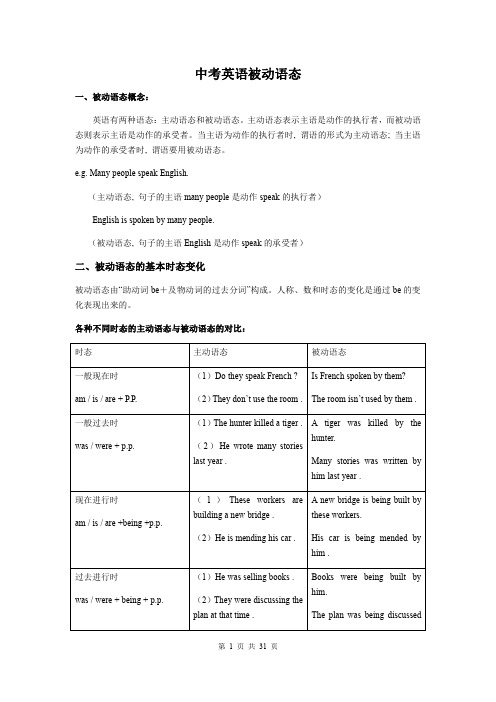
中考英语被动语态一、被动语态概念:英语有两种语态:主动语态和被动语态。
主动语态表示主语是动作的执行者,而被动语态则表示主语是动作的承受者。
当主语为动作的执行者时,谓语的形式为主动语态;当主语为动作的承受者时,谓语要用被动语态。
e.g.Many people speak English.(主动语态,句子的主语many people是动作speak的执行者)English is spoken by many people.(被动语态,句子的主语English是动作speak的承受者)二、被动语态的基本时态变化被动语态由“助动词be+及物动词的过去分词”构成。
人称、数和时态的变化是通过be的变化表现出来的。
各种不同时态的主动语态与被动语态的对比:时态主动语态被动语态一般现在时am/is/are+P.P.(1)Do they speak French?(2)They don’t use the room.Is French spoken by them?The room isn’t used by them.一般过去时was/were+p.p.(1)The hunter killed a tiger.(2)He wrote many storieslast year.A tiger was killed by thehunter.Many stories was written byhim last year.现在进行时am/is/are+being+p.p.(1)These workers arebuilding a new bridge.(2)He is mending his car.A new bridge is being built bythese workers.His car is being mended byhim.过去进行时was/were+being+p.p.(1)He was selling books.(2)They were discussing theplan at that time.Books were being built byhim.The plan was being discussedby them at that time.现在完成时have/has+been+p.p.(1)She has learned manyEnglish words.(2)He has finished the work.Many English words havebeen learned by her.The work has been finished byhim.过去完成时had+been+p.p.(1)They has solved theproblem.(2)We had told him the newsby then.The problem had been solvedby them.The news had been told to himby us.一般将来时shall/will be+p.p.(1)I shall make a plan.(2)They are going to fix theradio in an hour.A plan will be made by m.The radio is going to be fixedby them in an hour.过去将来时would be+p.p.was/were going to be+p.p.(1)He told me they wouldpaint the room.(2)They were going to puton a play the next week.He told me the room would bepainted by them.A play was going to be put bythem the next week.情态动词can/may/must/should +be+p.p.(1)We should hand in ourhomework.(2)You must answer thequestion in English.Our homework should behanded in by us.The question must beanswered in English by you.歌诀是:被动语态be字变,过去分词跟后面。
初中英语总复习知识点归纳

初中英语总复习知识点归纳初中英语总复习是所有初中生必须要经历的过程,这一过程不仅需要我们重温每一个单元里学过的知识点,还需要对每一个知识点进行和归纳,以便于我们更好地掌握英语知识。
下面是初中英语常见的知识点归纳:一、语法1. 时态英语中有12种基本时态,分别为:简单现在时、现在进行时、现在完成时、简单过去时、过去进行时、过去完成时、一般将来时、将来进行时、将来完成时、过去将来时、过去将来完成时、过去完成进行时。
这些时态的运用需要我们根据句子的具体情况进行判断。
2. 语态英语中有两种语态,分别为:主动语态和被动语态。
主动语态是指主语进行动作,而被动语态则是指主语被动接受动作。
3. 句型英语中有许多不同的句型,如简单句、并列句、复合句等等。
在学习每种句型时,我们需要掌握它们的基本结构和用法,并且会根据不同场合进行转换和组合。
4. 词法词语的分类、组合和变化是英语语法中的重要部分,我们应该掌握常用词汇的基本含义和用法,并且了解词汇的构成方式,以便更好地理解和掌握英语语法。
二、听力初中英语听力是英语学习中必不可少的环节。
为了提高自己的听力水平,我们应该:1.留意语音语调:英语中的语音和语调是十分重要的,我们应该学会分辨不同词汇和句子的语音和语调,并且模仿当地人的读音。
2.记录重点:在听力过程中,应该注意重点内容并加以记录,便于后期学习和复习。
3.熟悉常用短语:英语听力中常包含许多常用短语和表达,我们应该熟悉这些短语,便于更好地理解句子的含义。
三、阅读阅读是学习英语的重要环节,通过阅读我们可以拓宽自己的知识面,提高英语水平。
在初中英语学习中,阅读的主要内容包括:1.短文和故事:初中英语教材和课外读物中包含大量的短文和故事,这些内容可以帮助我们加深对英语语言和文化的理解。
2.文化背景知识:英语阅读中的许多内容都涉及到英语国家的历史和文化背景,我们应该对这些知识有一定的了解。
3.词汇量的提高:阅读时可以学习到更多的生词和短语,我们应该根据自己的实际情况来扩大自己的词汇量。
英语语法基础知识大全初中
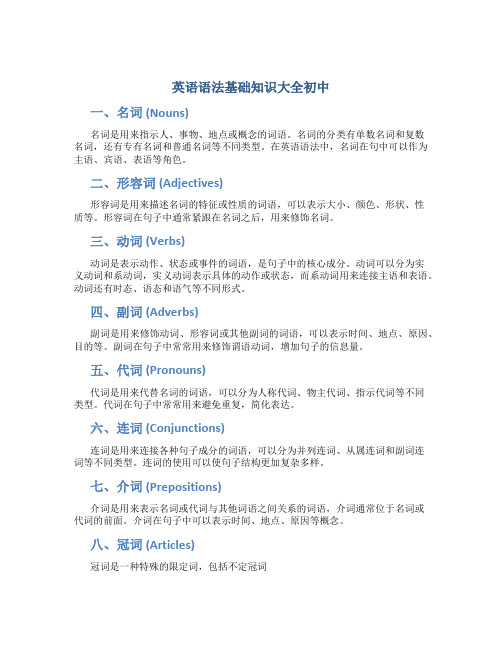
英语语法基础知识大全初中
一、名词 (Nouns)
名词是用来指示人、事物、地点或概念的词语。
名词的分类有单数名词和复数
名词,还有专有名词和普通名词等不同类型。
在英语语法中,名词在句中可以作为主语、宾语、表语等角色。
二、形容词 (Adjectives)
形容词是用来描述名词的特征或性质的词语,可以表示大小、颜色、形状、性
质等。
形容词在句子中通常紧跟在名词之后,用来修饰名词。
三、动词 (Verbs)
动词是表示动作、状态或事件的词语,是句子中的核心成分。
动词可以分为实
义动词和系动词,实义动词表示具体的动作或状态,而系动词用来连接主语和表语。
动词还有时态、语态和语气等不同形式。
四、副词 (Adverbs)
副词是用来修饰动词、形容词或其他副词的词语,可以表示时间、地点、原因、目的等。
副词在句子中常常用来修饰谓语动词,增加句子的信息量。
五、代词 (Pronouns)
代词是用来代替名词的词语,可以分为人称代词、物主代词、指示代词等不同
类型。
代词在句子中常常用来避免重复,简化表达。
六、连词 (Conjunctions)
连词是用来连接各种句子成分的词语,可以分为并列连词、从属连词和副词连
词等不同类型。
连词的使用可以使句子结构更加复杂多样。
七、介词 (Prepositions)
介词是用来表示名词或代词与其他词语之间关系的词语,介词通常位于名词或
代词的前面。
介词在句子中可以表示时间、地点、原因等概念。
八、冠词 (Articles)
冠词是一种特殊的限定词,包括不定冠词。
初级中学英语总复习资料精品讲义(精)
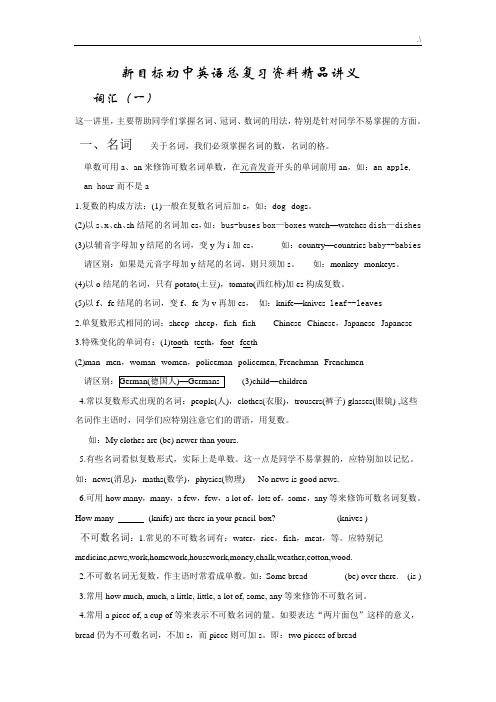
新目标初中英语总复习资料精品讲义词汇(一)这一讲里,主要帮助同学们掌握名词、冠词、数词的用法,特别是针对同学不易掌握的方面。
一、名词关于名词,我们必须掌握名词的数,名词的格。
单数可用a、an来修饰可数名词单数,在元音发音开头的单词前用an,如:an apple, an hour而不是a1.复数的构成方法:(1)一般在复数名词后加s,如:dog--dogs。
(2)以s、x、ch、sh结尾的名词加es,如: bus-buses box—boxes watch—watches dish—dishes(3)以辅音字母加y结尾的名词,变y为i加es,如:country—countries baby--babies 请区别:如果是元音字母加y结尾的名词,则只须加s。
如:monkey--monkeys。
(4)以o结尾的名词,只有potato(土豆),tomato(西红柿)加es构成复数。
(5)以f、fe结尾的名词,变f、fe为v再加es,如:knife—knives leaf--leaves2.单复数形式相同的词:sheep--sheep,fish--fish Chinese--Chinese,Japanese--Japanese3.特殊变化的单词有:(1)tooth--teeth,foot--feeth(2)man--men,woman--women,policeman--policemen, Frenchman--Frenchmen(3)child—children4.常以复数形式出现的名词:people(人),clothes(衣服),trousers(裤子) glasses(眼镜) ,这些名词作主语时,同学们应特别注意它们的谓语,用复数。
如:My clothes are (be) newer than yours.5.有些名词看似复数形式,实际上是单数。
这一点是同学不易掌握的,应特别加以记忆。
如:news(消息),maths(数学),physics(物理) No news is good news.6.可用how many,many,a few,few,a lot of,lots of,some,any等来修饰可数名词复数。
初一英语语法知识点总结复习(最新超详细版)
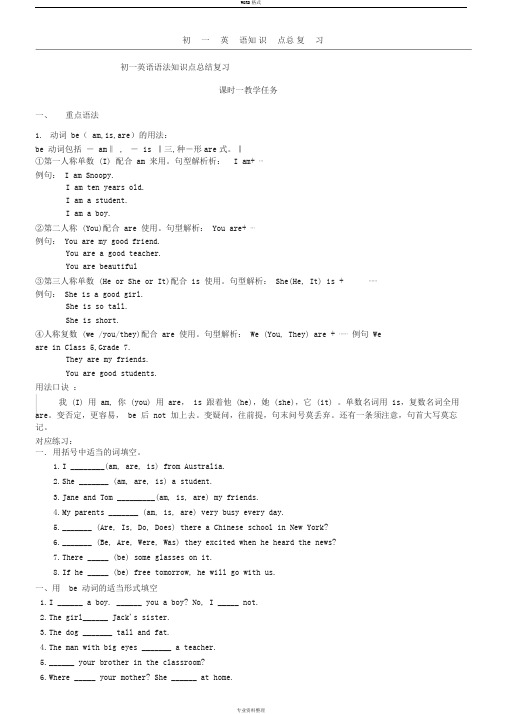
初一英语知识点总复习初一英语语法知识点总结复习课时一教学任务一、重点语法1. 动词 be( am,is,are)的用法:be 动词包括― am‖ , ― is ‖三,种―形are式。
‖①第一人称单数 (I) 配合 am 来用。
句型解析析: I am+ ⋯例句: I am Snoopy.I am ten years old.I am a student.I am a boy.②第二人称 (You)配合 are 使用。
句型解析: You are+ ⋯例句: You are my good friend.You are a good teacher.You are beautiful③第三人称单数 (He or She or It)配合 is 使用。
句型解析: She(He, It) is + ⋯⋯例句: She is a good girl.She is so tall.She is short.④人称复数 (we /you/they)配合 are 使用。
句型解析: We (You, They) are + ⋯⋯例句 Weare in Class 5,Grade 7.They are my friends.You are good students.用法口诀:我 (I) 用 am, 你 (you) 用 are, is 跟着他 (he),她 (she),它 (it) 。
单数名词用 is,复数名词全用are。
变否定,更容易, be 后 not 加上去。
变疑问,往前提,句末问号莫丢弃。
还有一条须注意,句首大写莫忘记。
对应练习:一.用括号中适当的词填空。
1.I ________(am, are, is) from Australia.2.S he _______ (am, are, is) a student.3.J ane and Tom _________(am, is, are) my friends.4.M y parents _______ (am, is, are) very busy every day.5._______ (Are, Is, Do, Does) there a Chinese school in New York?6._______ (Be, Are, Were, Was) they excited when he heard the news?7.T here _____ (be) some glasses on it.8.I f he _____ (be) free tomorrow, he will go with us.一、用 be 动词的适当形式填空1.I ______ a boy. ______ you a boy? No, I _____ not.2.T he girl______ Jack's sister.3.T he dog _______ tall and fat.4.T he man with big eyes _______ a teacher.5.______ your brother in the classroom?6.W here _____ your mother? She ______ at home.7.H ow _______ your father?- 1 -初一英语知识点总复习8.M ike and Liu Tao ______ at school.9.W hose dress ______ this?10.W hose socks ______ they?11.T hat ______ my red skirt.12.W ho ______ I?13.The jeans ______ on the desk.14.Here ______ a scarf for you.15.H ere ______ some sweaters for you.16.T he black gloves ______ for Su Yang.17.T his pair of gloves ______ for Yang Ling.18.T he two cups of milk _____ for me.19.S ome tea ______ in the glass.20.G ao shan's shirt _______ over there.第二课时( 1)英语人称代词和物主代词一、人称代词表示―我‖、―你‖、―他‖、―她‖、―它‖、―我们‖、―你们‖、―他们‖的词,叫做人称代词。
初中英语知识点大总结

初中英语知识点大总结
一、基础语法知识
1.词类及其用法:名词、代词、动词、形容词、副词、介词、连词、冠词
2.句子结构:主语、谓语、宾语、宾补、定语、状语、主谓一致、名词性从句、定语从句、状语从句
3.时态及其用法:一般现在时、一般过去时、一般将来时、现在进行时、过去进行时、过去将来时、现在完成时、过去完成时、将来完成时
4.被动语态:一般现在时、一般过去时、一般将来时、现在进行时、过去进行时、过去将来时、现在完成时、过去完成时、将来完成时
5.倒装句:全部倒装、部分倒装、虚拟条件句的倒装、表示地点的倒装
6.名词的所有格:名词的所有格及其用法
7.句型转换:陈述句转换为一般疑问句、反意疑问句、祈使句等
8.强调句:部分强调、完全强调
二、词汇知识
1.词义辨析:相近词辨析、词义辨析、常用短语辨析
2.词组、固定搭配、短语:常用短语、固定搭配、常用俚语等
3.同义词、反义词:常见的同义词、反义词及其用法
三、阅读理解
1.找主题句、主旨句、中心句等
2.理解文章结构:描写事物的顺序、因果关系、对比关系、转折关系等
3.推理判断:根据文章中的信息判断合理或不合理、对错等
四、写作技巧
1.书信写作:如邀请信、感谢信、道歉信等
2.日记:过去发生的事情、现在正在做的事情、将来打算做的事情等
3.描述:人物描述、地点描述等
4.叙事:根据指定的素材写一篇完整的叙事作文。
- 1、下载文档前请自行甄别文档内容的完整性,平台不提供额外的编辑、内容补充、找答案等附加服务。
- 2、"仅部分预览"的文档,不可在线预览部分如存在完整性等问题,可反馈申请退款(可完整预览的文档不适用该条件!)。
- 3、如文档侵犯您的权益,请联系客服反馈,我们会尽快为您处理(人工客服工作时间:9:00-18:30)。
中学英语基础知识分类总复习(五)非谓语动词(一)50题从A、B、C、D四个选项中,选出可以填入空白处的最佳选项。
1. When he was a boy, he used to go there and watch _____.A. to repair bicyclesB. bicycles to be repairedC. bicycles being repairedD. repairing bicycles2. — Have you considered _____ your job as a teacher?— Yes. I like the job because a teacher is often considered _____ a gardener.A. to change; to beB. to change; beingC. changing; beingD. changing; to be3. The dog, _____, will be made a good watchdog.A. to train properlyB. being trained properlyC. properly to trainD. trained properly4. _____ the diamond, he had to look for a place to hide it.A. Having stolenB. Having been stolenC. StolenD. Stealing5. _____ the front door _____, he had to enter the room through the back door.A. Seen; paintedB. Seeing; paintedC. Being seen; being paintedD. Seeing; being painted6. And there, almost _____ in the big chair, sat her little brother, who never had to be told to keep quiet.A. having lostB. losingC. to be lostD. lost7. He looked around and caught a man _____ his hand into the pocket of a passenger.A. putB. to be puttingC. to putD. putting8. To answer correctly is more important than _____.A. that you finish quicklyB. finishing quicklyC. to finish quicklyD. finish quickly9. The old farmer, _____ the badly injured and burnt soldier, came out of the burning farmhouse, calling continuously for help.A. supportingB. having supportedC. being supported byD. being supported10. In January , 2004, the United States succe ssfully launched “Spirit”, a Mars Exploration Rover, _____ a new milestone in the history of mankind.A. it markedB. markingC. markedD. to mark11. It was getting dark; I found a car _____ in a pool by the side of the road.A. to be stuckB. stuckC. stickingD. stick12. You can’t imagine what great trouble they have _____ the problem _____.A. to solve; being talked aboutB. solving; discussingC. to solve; to talk aboutD. solving; being discussed13. The monument was built in honor of the explorer who was believed _____ the river.A. to have discoveredB. to have been discoveredC. to discoverD. having been discovered14. The thief fell to the ground, his left foot _____ and blood _____ down from his mouth.A. breaking; runningB. broken; runningC. breaking; runD. broken; run15. The program was so exciting that the children kept their eyes _____ on the screen.A. to fixB. to be fixedC. fixedD. fixing16. As I will be away for at least a year, I’d appreciate _____ from you now and then so thatI can know how everyone is getting along.A. having heardB. to hearC. hearingD. being heard17. _____, the subject was always in my mind.A. Walking or sleepingB. Walking or sleptC. Having walked or sleptD. To walk and sleep18. — Did you get a dictionary?— No, I _____, but there were not any _____.A. tried; to be leftB. had tried to; leavingC. tried to; leftD. had tried; have left19. When he came to, he found himself _____ on a chair, with his hands _____ back.A. to sit; tyingB. sitting; tyingC. seating; tiedD. seated; tied20. The joke told by Tom made us _____, so the teacher couldn’t make himself _____.A. to laugh; hearingB. laughing; heardC. laughing; hearD. laughed; heard21. All of the flowers now _____ here have developed from those once _____ in the forest.A. raised; grownB. rising; growingC. raised; growingD. rising; grown22. Henry can’t attend the party _____ at Tom’s house a t present because he is preparing the speech at the party _____ at Marie’s house tomorrow.A. held; being heldB. to be held; to be heldC. to be held; heldD. being held; to be held23. Seeing the soldiers well _____ for the flood-fight, the general nodded with satisfaction.A. prepareB. preparingC. preparedD. having prepared24. Don’t worry. I’ll have it _____ and get someone _____ it to you tomorrow.A. typed; sendB. to type; to sendC. type; sendD. typed; to send25. The sun was shining brightly, _____ everything there _____ more beautiful.A. making; lookB. to make; lookedC. and made; lookingD. and making; be looked26. How could he get the plan _____ without any one to support him?A. to carry outB. carry outC. carrying outD. carried out27. New ideas sometimes have to wait for years before _____.A. being fully acceptingB. fully acceptingC. having fully acceptedD. fully accepted28. Having passed all the tests, she felt a great weight _____ off her mind.A. takingB. takenC. takeD. to be taken29. I’m examining the article he has just f inished _____ the possible mistakes in it.A. being correctedB. to correctC. correctedD. having corrected30. _____ full preparations, we decided to put off the meeting till next week.A. We did not makeB. Having not madeC. We had not madeD. Not having made31. We should prevent such a silly mistake _____ again.A. occurringB. to occurC. to be occurredD. from being occurred32. I regret _____ hard at school, or I would have succeeded in passing the exam.A. not to workB. having not workedC. to have not workedD. not having worked33. They looked forward with hope _____ a chance to receive further education.A. for gettingB. of gettingC. to getD. to getting34. “Well, I’ll tell you a secret ...” said the boy, with his mouth almost _____ my ear.A. touchedB. touchingC. touchD. to touch35. Towards evening, the patient opened his mouth as if _____ something to his son.A. saidB. sayC. to sayD. to have said36. — Would you be _____ lend me your bicycle?— Sure.A. so kind as toB. kind enough as toC. very kind toD. so kind to37. The beach is so beautiful that it is worthwhile, I think, _____ for a short holiday.A. of goingB. to be goingC. your goingD. you to go38. The teacher asked more _____ to prevent the students’ eyes from being injured.A. to doB. doneC. to be doneD. being done39. Some of the schools in Shanghai have moved one step closer to _____ with the global education community.A. being connectedB. connectC. having connectedD. be connected40. The performance of the host, _____ to please the audience and draw their attention, was greeted with a cold silence, however.A. had intendedB. intendedC. being intendedD. to intend41. _____ and out of breath, we reached the top of the mountain and stopped _____ the beautiful scenery.A. Tiring; to admireB. Being tired; admiringC. Tired; to admireD. Tired; admiring42. The 18-storeyed building, when _____, will shut out the sun _____ up the rooms in my house.A. completed; lightedB. completing; lightingC. completing; lightedD. completed; lighting43. — I hear Warren _____ in a middle school.—What? I can’t imagine him _____ as a teacher.A. teaches; workingB. teaches; workC. teach; to workD. teach; working44. _____ he’s only been learning English for a year, he speaks it very well.A. ConsideredB. ConsideringC. Having consideredD. To consider45. It was _____ computer games that cost the boy a lot of time that he ought to have spent on his lessons.A. to have playedB. playingC. playedD. having played46. At no time does the salesgirl get up late in the morning, for she is always too busy _____a good rest.A. to takeB. takingC. tookD. taken47. _____ as the most excellent student in her university, as most classmates had expected, made her parents very happy.A. Mary was chosenB. Mary chosenC. Mary being chosenD. Mary’s being chosen48. _____ the big snake, the little girl stood under the tree _____ to death.A. Seeing; frightenedB. Seeing; frighteningC. Seen; frightenD. To see; frightening49. You will see this product made in this factory _____ wherever you go.A. to be advertisedB. advertisedC. advertiseD. advertising50. Mr. Green is said _____ an experiment to prove the new method of solving the problem when young.A. to doB. to have doneC. to be doingD. to have been doing非谓语动词(一)50题1-5 CDDAD 6-10 DDCAB 11-15 BDABC 16-20 CACDB 21-25 CDCDA26-30 DDBBD 31-35 ADDBC 36-40 ACCAB 41-45 CDABB 46-50 ADABB。
